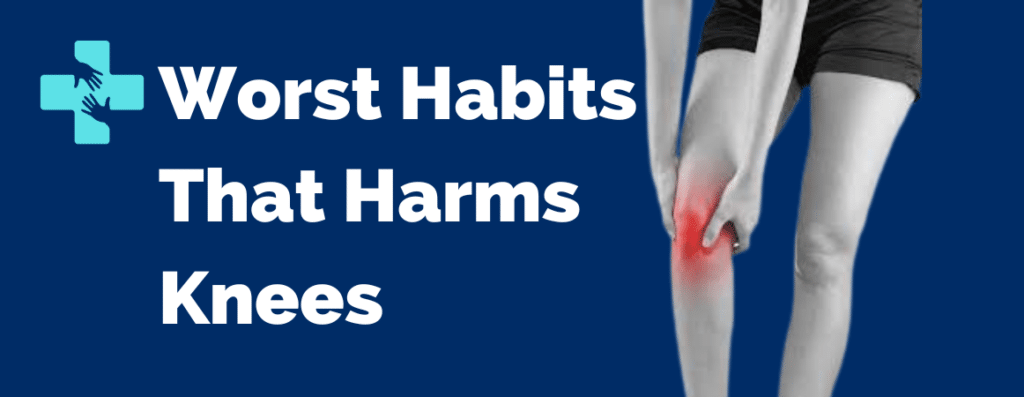Bad Habits That Could Be Worsening Your Knee Pain

Accidents and illnesses that impact your knees can come unexpectedly. In such cases, you might not have much control over the situation. But more often than not we see people suffering from knee pain because of everyday habits we do without even realizing. Maybe these habits are making your knee pain worse too?
However, many people engage in everyday activities and habits that could inadvertently harm their knees. These activities may seem harmless, but in reality, they can be detrimental to your knee health.
In this article, we will discuss the worst habits that can harm your knees and how to avoid them. Here are the top five culprits that you need to be aware of.
Bad habits that lead to knee pain
Knee pain can be caused by a variety of factors, including injury, inflammation, and arthritis. However, many people engage in bad habits that could exacerbate knee pain and lead to further damage to the knee joint. Some of the common bad habits that might be making your knee pain worse:
- Pounding your knees
- Carrying too much weight
- Standing or sitting too long
- Engaging in the wrong type of exercise
- Locking your knees
These habits place extra pounds of additional stress on the knees, leading to pain and inflammation.
Wearing Shoes That Stress Your Knee
Wearing the wrong shoes can put extra stress on your knees and lead to knee joint pain. High heels, flip flops, and shoes with improper arch support can all contribute to joint pain. High heels can cause your body weight to shift forward, placing additional stress on your knee joints. Flip flops provide little support and can cause your feet to slide, putting extra stress on your knee joint. Shoes with improper arch support can also contribute to knee pain by altering the way you walk, putting additional stress on your knee joint.
To avoid knee pain, choose shoes that provide proper arch support and cushioning. Look for shoes with a low heel and a wide toe box, which can help distribute your weight evenly and reduce stress on your knee joint. Orthotic inserts can also provide additional support and cushioning to your feet to help alleviate knee pain.
Pounding The Pavement
Pounding the pavement can be a great way to stay active, but it can also put extra stress on your knees. Activities like running and jumping can cause a repeated impact on your knee joint, leading to knee pain and inflammation. This type of physical activity also can be particularly harmful if you have existing knee problems or injuries.
To avoid knee pain from pounding your knees, choose lower-impact activities like cycling, swimming, or walking. These activities can still provide a great workout without putting as much stress on your knee joint. If you enjoy running or jumping, consider running on a softer surface like a track or grass, which can help your legs absorb the impact and reduce stress on your knee joint.
Carrying Too Much Weight
Carrying extra pounds can put additional stress on the muscles around your knee joint, leading to knee pain and inflammation. Excess weight can also cause your body to produce inflammatory chemicals that can exacerbate the pain.
To avoid the pain of carrying extra weight, focus on losing weight through a combination of healthy eating and regular exercise. Losing even a few pounds can help reduce stress on your knee joint and alleviate the pain. Consult with your healthcare provider for guidance on the best weight loss and exercise plan for you.
Standing or Sitting Too Long
Standing or sitting in one position for too long can cause knee pain. When you stand or sit for extended periods, you put additional pressure on your knee joints, leading to pain and inflammation. If you have a job that requires you to stand or sit for long periods, take breaks and move around every 30 minutes to reduce the pressure on your hips and knees.
Locking Your Knees
Locking your knees while standing can put unnecessary stress on your knee joints and lead to pain and inflammation. Instead, try to keep a slight bend in your knees to alleviate the rest of the pressure. If you have a tendency to lock your knees, physical therapy can help you retrain your muscles to maintain proper form and prevent pain.
Engaging in The Wrong Type Of Exercise
Some exercises are particularly hard on the knees, such as lunges, squats, and sudden stops. If you have chronic knee pain, it is important to avoid these exercises or modify them to reduce the stress on your knees. Instead, focus on low-impact exercises that are gentle on the knee joints, such as swimming or cycling.
In addition to avoiding bad habits that worsen knee pain, there are several things you can do to promote knee health:
- Maintain a healthy body weight
- Incorporate strength training to support your knee joints
- Practice proper arch support
- Consider physical therapy to address chronic knee pain
- Work with your doctor to manage rheumatoid arthritis or other conditions that can cause knee pain
Overall, there are many bad habits that can lead to knee pain and worsen existing knee problems. By avoiding these habits and incorporating healthy practices such as regular exercise, proper shoe choice, and strength training, you can maintain good knee health and reduce the worsening of your knee pain and the risk of chronic knee pain. If you are already experiencing the pain, it is important to seek proper medical attention and follow a treatment plan that addresses the root cause of your pain. With the right care and attention, you can keep your knees healthy and pain-free for years to come.